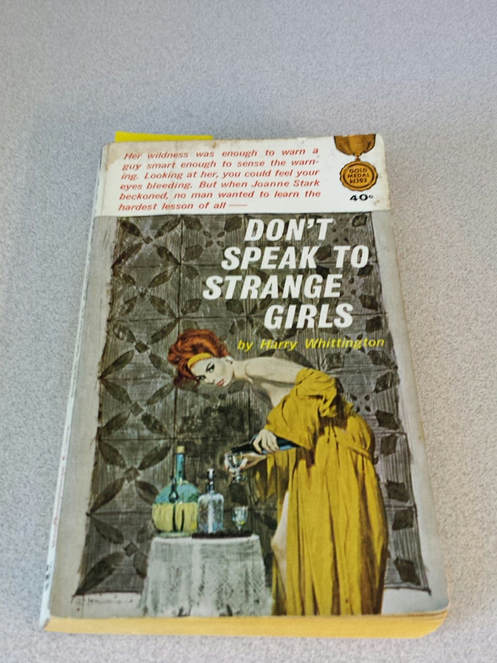I've read a lot of Harry Whittington. A couple I've really liked, a few I've liked less, but this is the only one I've actively disliked and since I haven't seen much about it elsewhere online, I decided I'd post my thoughts in case someone is curious about the book (like I was, when I saw the cover on a tumblr aggregator a while back) and its relations to the rest of Whittington's body of work.
It's a literary novel about Clay Stuart, an aging Hollywood superstar, one of the last of the mega-stars in the same category as Cary Grant, Clark Gable, etc, we're told, whose wife of 25 years passes away. He is, understandably, lost without her. Despite the fact that he mainly ignored her during their life together, he's come to realize what a big presence she really was in his home and life.
With Ruth gone, Clay is listless. He doesn't have any interests, he can't work, barely eats. Does little but drink and sleep. His personal manager, knowing him better than anyone, finds a girl who is Clay's perfect dream woman, hires her to pick him up, make him fall for her, etc (all beknownst to Clay or the other people who work for him) thinking Clay will be wrested from his stupor, get a little life in him and go back to work. Only the girl, Joanne Star,k is smarter than any of them realize and has plans of her own.
The set-up has potential, but Whittington doesn't use it well.
Clay and Joanne have a torrid love affair, but all she's really after is a career boost. She wants to be a movie star. Using his connections, Stuart gets her a screen-test with a very famous director, who hires her for a lead in a low-budget film. It's not much, but she's on her way and dumps Clay. Predictably, he has a nervous breakdown and is left worse off than when Ruth died. Even after his agent (not his personal manager, who hired the girl) plays private detective (for all of maybe 1500 words), learning that she's a con artist with a long history of scamming men, breaking homes, marriages and careers to get what she wants, Clay still loves her, he says, even knowing she probably never cared for him at all.
There were all sorts of ways Whittington could have gone from here, but he went very safe, and too predictable, while setting up a couple lame red herrings that were never followed up on. For example, he repeatedly implies and then outright tells us that Clay has a weak heart, seemingly foreshadowing Clay's death, by either accident or murder. Nothing comes of it. Whittington simply stops mentioning it three-quarters of the way through the novel.
Anyway, Clay pines for Joanne, mopes a lot, stalks her a little tiny bit, finally decides he's just going to go to her apartment house and wait for her. But when he sees how Joanne lives--in squalor, with a bunch of drugged up, oversexed hippies, who go after him, violently, delighting in a chance to beat on a big celebrity (it's entirely unprovoked, Clay does nothing to upset them)--he comes to his senses and washes her out of his mind and heart.
Meanwhile, Joanne thinks she's going to be a big star, only to discover that she's got such a terrible screen-presence (the audience can tell she's a miserable phony, as one director puts it) that the studio has only hired her as a favor to Clay and that once shooting wraps on her single film, they're cutting her loose. The film is unwatchable, but the studio is willing to eat a minor loss to keep a big name like Clay happy (so they think). When she learns this, she decides she wants Clay back (of course), but he's realized she's poison and sends her packing. He goes back to work, taking a meeting with a big director about a part in a major film, only to come home and discover Joanne has returned while he was out and killed herself in his pool, apparently hoping to ruin him with scandal according to witnesses to her ranting.
Here, Whittington could have given us another five or ten thousand words about the fall-out and Clay's career being ruined or something like that, but nothing comes of Joanne's ersatz tragedy. Clay's personal manager, who originally hired her, it turns out, still has cancelled checks showing payments to Joanne and simply claims that the girl was a deranged employee of hers to the police and media, allowing the potential scandal to wash right over Clay.
At the end of the book, I was left thinking: "So what? Why am I supposed to care about this?" There was no major personal growth for the main characters, no lasting consequences for Clay, the protagonist. The only change at all, really, is his May/December romance has made him accepting of his daughter Sharon's (who is the same age as Joanne and is engaged to a middle-aged man who sincerely loves her), but even that seemed like an afterthought.
There just didn't seem to be any point to this novel and I was left feeling cheated of my time and money. It's one of Whittington's rarer books to find, which is why I was interested in the first place, but after reading it, I'm guessing it's relatively rare because it didn't sell when first published - and with good reason. It's just not a good example of either Whittington's work or a novel in general.


 RSS Feed
RSS Feed